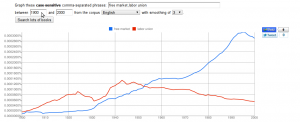I haven’t done a formal analysis of this yet. Just an informal one using a NYTimes.com search for Ralph Nader.
On July 1, 2008, CNN published a poll that put Ralph Nader at 6%. On February 24, 2008, Ralph Nader formally announced his bid for presidency on “Meet the Press.” What happened in the intervening four months?
Not much, according to the ‘liberal’ NYTimes. In the days following Nader’s announcement, the NYTimes had a bit of activity. You can see the full details by looking at the newspaper’s Ralph Nader feed. Two articles were published immediately after the announcement, one merely rehashing the “Meet the Press” discussion. The second one was more interesting, as it appeared as an editorial and was called, “Ralph Nader: Going, Going, not Gone”. In it, Eleanor Randolph repeats the typical diatribe about Ralph Nader ‘spoiling’ the 2000 election, seemingly with detachment, but then points to Bush’s presidency as being a regrettable outcome. Here’s a select piece:
Many Democrats still believe, bitterly but without conclusive evidence, that Mr. Nader siphoned off a lot of Democratic votes in the 2000 presidential election. He argued that the main candidates, George W. Bush and Al Gore, were nothing more than “Tweedledum and Tweedledee,” two peas in a pod, no daylight between them.
The Republican Tweedle won the presidency, and the Bush administration went on to gut, hobble or hamstring many of the safety agencies that Mr. Nader had fought so hard to create. Mr. Gore got a Nobel Peace Prize for raising concern about global warming.
If there is a stronger word for whoops, it certainly applies here. But that does not seem to cast a shadow on the Nader enthusiasms.
Bob Herbert’s Op-Ed, “A Driving Force”, published the same day, seems to recognize Nader’s ‘right to run,’ but also points out, somberly, how Democrats despise and Republicans will encourage his run to force another ‘spoiler’ outcome. This was followed by a couple of narrow-interest pieces, one on Nader supporters (entitled “Trying Times for Remaining Nader Faithful”) and one about Nader’s vice presidential pick, Matt Gonzales. This news activity all occurred at the end of February.
In the intervening 4 months, there hasn’t been a single news article covering Nader’s campaign in The New York Times. Not one. I think it’s fair to say that there hasn’t been a day that has passed since February where there were any fewer than two or three articles on the other presidential candidates.
There have been a couple of Nader mentions buried deep within other articles, but no mention of the fact that Nader has secured access to quite a few state ballots. No background on his campaign or profile of his person. No interviews with him, his vice presidential pick, staffers, or anyone else involved with his campaign. And no mention of this remarkable number — 6% in a national opinion poll by CNN. That’s 6% despite no coverage in the NYTimes, and not much coverage elsewhere in the Mainstream Media.
Is this a media blackout? Well, there is no other way to classify it.
Related to my last post, who determines the content of the news: journalists and editors (and their masters), or we, the people? If the news really reflects our interest, why is it that 6% of the political news coverage of the last four months hasn’t been about Nader? I’m not asking for there to be equal news coverage as Obama or McCain. But why not at least an in-depth article or two? This is a presidential candidate making a serious run. Nader also has better credentials and deeper experience with Washington and politics than Obama or McCain. Why is it that the media continues to ignore him? I know there’s at least one explanation, but the effects still baffle me.

